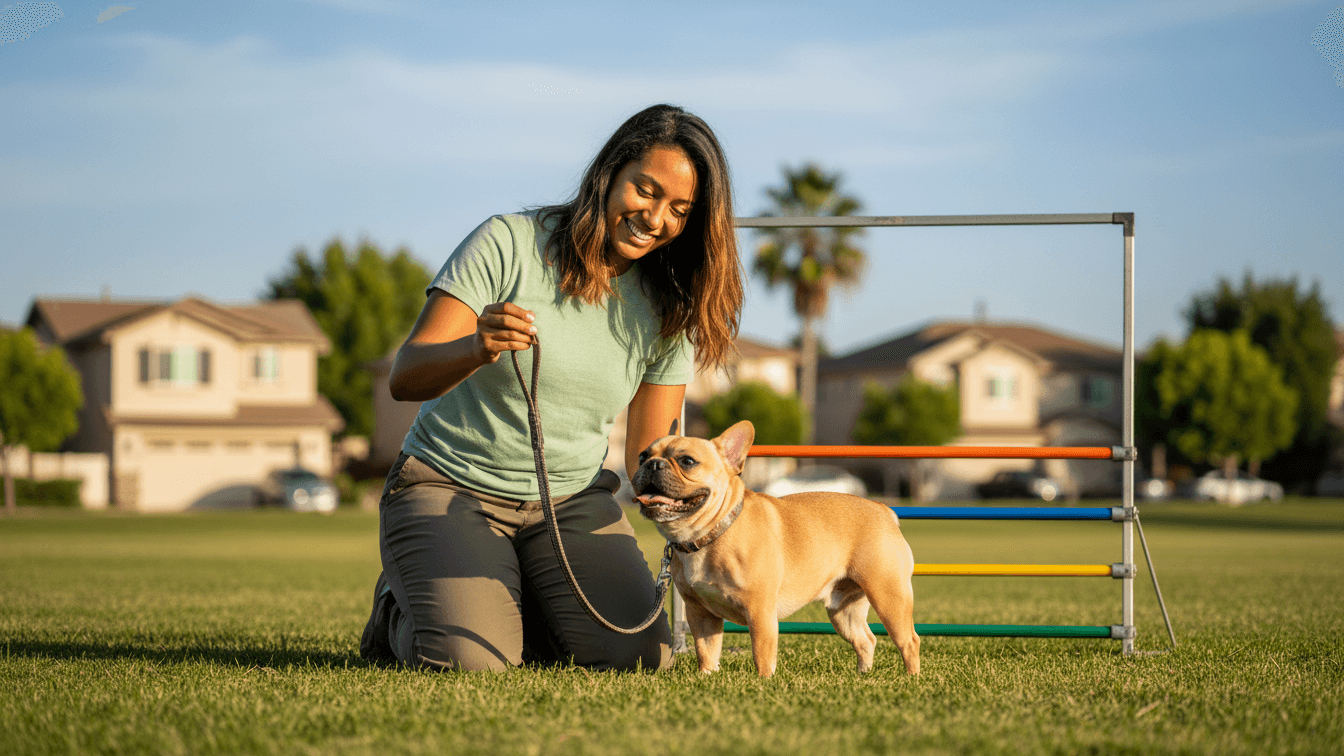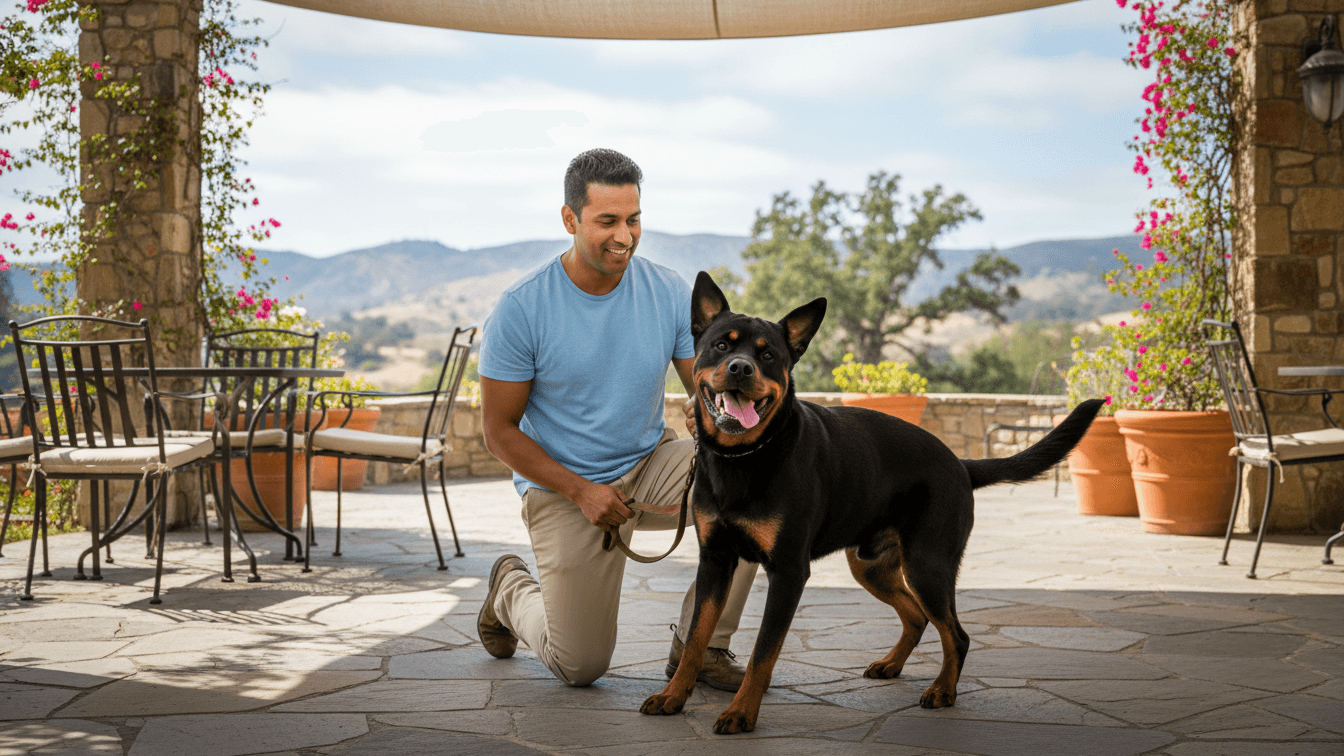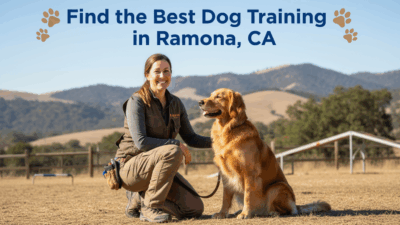Your Complete Guide to Choosing a Dog Trainer in Ramona and Surrounding Areas
Living in Ramona means your dog will be navigating rural roads, hiking trails in the backcountry, and managing encounters with wildlife and livestock. Your dog needs to stay focused during trail walks, remain calm around horses on Main Street, and behave politely at outdoor cafes along Montecito Road.
Since Ramona sits in San Diego County, local regulations follow county guidelines with some additional considerations for this rural foothill community. When you find a trainer who understands life in this unincorporated area, you’ll get better results both on your property and out in the community.
How to Choose the Right Trainer
Start by looking for someone who uses positive reinforcement training and can set realistic goals for your Ramona lifestyle. This means your dog should learn to walk calmly past horses and chickens, stay focused when encountering deer or coyotes, and handle the longer car rides that come with living in a spread-out community.
Credentials give you a quick way to compare trainers’ experience levels. Common dog trainer certifications include KPA-CTP, CPDT-KA, or IAABC-CDBC for behavior problems. If your dog has serious aggression issues, look for someone with CBCC-KA or a science-based program like CTC.
In-home dog training works great for Ramona properties since trainers can address real-world challenges like front gate behavior, livestock reactivity, and property boundaries. Group classes make sense once your dog can focus around other dogs, especially before you try busy spots like the Ramona Feed Store or weekend farmers market.
Common Dog Training Methods Explained

Reward-based methods build the trust you want while creating lasting behavior changes. They also help your dog learn to handle Ramona’s unique challenges without fear or aggression.
Basic obedience covers sit, down, stay, place, recall, and leash training so your dog can handle trips to town, vineyard visits, and trail encounters without pulling or jumping on people. Strong recall becomes especially important when living near open spaces and wildlife.
Puppy training focuses on socialization, potty training, bite control, crate comfort, and early leash skills. Starting with short, positive training sessions prevents bad habits from forming and helps puppies adjust to rural life, including livestock, unusual sounds, and varied terrain.
Behavior modification addresses fear, reactivity, resource guarding, or separation anxiety through careful desensitization and counterconditioning. For serious cases, ask if your trainer works with local veterinarians in Ramona or nearby communities.
Private lessons and in-home services let you customize everything around your daily routines and property layout. Many Ramona dog owners prefer this option since it addresses specific challenges like gate behavior, property patrol, and livestock management.
Dog training classes help your dog practice good manners around other dogs and people. The best classes give dogs plenty of space, screen participants carefully, and teach calm behavior rather than just excitement.
Specialized training like therapy dog training or service dog training requires extra structure, public-access skills, and a very clear step-by-step program. These programs demand consistent practice in various environments.
Stay away from trainers who use fear, intimidation, or pain to get results. Humane methods are safer for everyone, easier to maintain long-term, and much better for keeping peace with your neighbors and their animals.
Average Cost of Dog Training in Ramona, CA and Surrounding Areas (Updated for 2025)
Prices around Ramona and San Diego County depend on the trainer’s experience, how long sessions last, and travel distance. Trainers serving Ramona often charge travel fees since the community sits farther from San Diego’s urban centers. Here’s what most local pet owners are paying in 2025.
| Service Type | Average Cost (Ramona/San Diego County) |
|---|---|
| Puppy classes (4-6 weeks) | $160-$290 total |
| Group obedience classes (4-6 weeks) | $175-$320 total |
| Private lessons (60-90 min) | $120-$200 per session |
| In-home coaching packages (4-6 visits) | $480-$1,000 total |
| Day training (trainer works your dog + handoff) | $500-$1,100 per week |
| Behavior consult for reactivity/anxiety (initial) | $175-$275 |
| Board and train (2-4 weeks) | $2,200-$5,000 total |
You’ll probably pay extra travel fees for trainers coming from Poway, Escondido, or other San Diego County areas. Expect higher rates for complex behavior work or specialized programs.
Make sure you understand what’s included, how the trainer tracks progress, and whether they offer a free consultation before you sign up. Many professional dog trainers will visit your property to assess the situation before recommending a training program.
Questions to Ask a Potential Dog Trainer
- What dog training services do you use, and how do you keep sessions positive and low-stress?
- What credentials do you have, like KPA-CTP or CPDT-KA? Do you keep up with continuing education such as CPDT-KSA?
- Have you worked with dogs in rural settings and do you understand challenges like livestock reactivity and wildlife encounters?
- How will you customize the training plan for my dog’s specific needs and our Ramona lifestyle?
- Do you offer in-home visits, group classes, or day training, and which approach fits my goals best?
- How will we measure my dog’s progress and know when to add more distractions?
- What are the total costs, including any travel fees to Ramona, and what’s your cancellation policy?
- Do you carry liability insurance, and can you show me proof?
- For behavior problems, will you work with my veterinarian if needed?
- What should I practice between our training sessions to help your dog keep improving?
Local Ramona and San Diego County Rules and Considerations
Ramona follows San Diego County regulations for animal control and public health. Understanding these rules helps you stay compliant and keeps your dog safe.
Leash laws require dogs to be on leash in all public areas unless in a designated off-leash area. San Diego County Code Section 62.669 requires owners to keep dogs under control at all times, and this becomes especially important on rural roads and trails where wildlife encounters are common.
California law requires current rabies vaccination for all dogs over four months old. You’ll need a valid rabies tag on your dog’s collar, and you can get vaccinations through your veterinarian or low-cost county clinics.
San Diego County requires dog licenses for all dogs over four months old. You can obtain licenses through the County of San Diego Department of Animal Services website, and you’ll need proof of current rabies vaccination. License fees are lower for spayed or neutered dogs.
Excessive barking can be considered a nuisance under county ordinances, so work with your trainer on alert barking and separation anxiety before neighbors start complaining. This becomes particularly important in Ramona’s semi-rural setting where sound carries across properties.
California doesn’t require special licenses for expert dog trainers, but if a business boards dogs for payment, they may need permits and facility inspections. Check with San Diego County Department of Environmental Health for boarding facility requirements.
Property owners in Ramona need to be mindful of livestock interaction laws. Dogs that chase or injure livestock can be subject to serious penalties, making proper training and containment critical.
Local Ramona Resources for Dog Owners
These spots give you great places to practice polite manners, work on recalls, and provide safe enrichment for your dog. Always follow the posted rules and etiquette guidelines.
- Ramona Dog Park on Dye Road offers a fenced area where dogs can practice off-leash skills safely. Visit during quieter times to work on recall and calm greetings without overwhelming your dog.
- Mount Woodson Trail welcomes leashed dogs and provides excellent opportunities to practice focus around hikers, mountain bikers, and occasional wildlife. The challenging terrain helps build your dog’s confidence and physical fitness.
- San Vicente Reservoir trails allow leashed dogs and offer beautiful settings for leash training and distance work. Remember to bring water for both you and your dog on these longer walks.
- Lake Poway Recreation Area in nearby Poway permits leashed dogs on trails and offers varied terrain perfect for building real-world skills.

FAQs
How much does in-home dog training cost?
Most trainers serving Ramona charge $120-$200 per in-home visit, with travel fees often added for the distance. Behavior problems typically start at the higher end of that range, and packages offer better value than single sessions.
Is in-home dog training worth it?
Absolutely, especially in Ramona where property layouts and rural challenges vary so much. Your trainer can address gate behavior, livestock encounters, wildlife distractions, and property boundaries right where they happen, then help you practice skills on your actual roads and trails.
Can you pay someone to house train your dog?
Yes, many trainers offer puppy training programs that include potty training, crate routines, and daily schedules. Day training can speed up the process while teaching you how to maintain the progress on your own.
What is the 3-3-3 rule for dog training?
This is a helpful timeline for new or adopted dogs: expect about 3 days for your dog to decompress, 3 weeks to learn your routines, and 3 months to feel completely settled. Good training plans work with this natural adjustment period instead of rushing results.
How long will it take to reach my training goals?
Most puppies and friendly adult dogs show solid progress within 4-8 weeks if you practice daily. Fear, reactivity, or aggressive dog training typically requires several months of careful behavior modification with gradual increases in difficulty.
What should I bring to group classes?
Pack a flat collar or harness, a 6-foot leash, high-value treats, water, and current vaccination records if your trainer requests them. Leave retractable leashes at home for safety reasons.
What’s the leash law in Ramona?
Dogs must be leashed and under control in all public areas under San Diego County regulations. Keep that 6-foot leash handy for trails, roads, and community events. Off-leash activity is only permitted in designated dog parks.
Do I need a dog license in Ramona or San Diego County?
Yes, San Diego County requires licenses for all dogs over four months old. You’ll need current rabies vaccination proof to obtain a license through the County of San Diego Department of Animal Services. Licenses must be renewed annually.
What shots does my dog need in San Diego County or California?
Rabies vaccination is required throughout California for dogs over four months old. Your veterinarian may also recommend distemper-parvo, bordetella, and leptospirosis based on your dog’s lifestyle and Ramona’s rural environment.
Are dog trainers required to be licensed in Ramona or San Diego County or California?
No special licenses exist for dog trainers in California. Trainers follow normal business regulations, but facilities offering boarding services may need permits through San Diego County Department of Environmental Health.
Where can I practice off-leash recall?
Use the fenced dog park on Dye Road to keep things safe and legal. Try visiting during quieter hours when you’re starting out so your dog can focus better on learning.
Which dog parks allow training around Ramona and surrounding areas?
Ramona Dog Park on Dye Road allows off-leash play within its fenced area. In nearby Poway, the Poway Dog Park offers additional space for practicing recalls and socialization.
What trails allow dogs for training?
Mount Woodson Trail and San Vicente Reservoir trails welcome leashed dogs and provide excellent settings for leash training, focus work, and building calm behavior around hikers and cyclists. Lake Poway trails offer similar opportunities in a nearby location.
What should I know about wildlife encounters while training?
Ramona’s location means regular encounters with deer, coyotes, rabbits, and various birds. Work with your trainer on a solid “leave it” command and practice focus exercises before attempting trails. Keep dogs leashed to protect both wildlife and your pet.
How do I help my dog adjust to livestock?
Many Ramona properties have horses, chickens, goats, or other livestock nearby. Start socialization early and work with a certified dog trainer who understands desensitization techniques. Never allow your dog to chase or harass livestock, as this violates county ordinances and can result in serious consequences.
The right combination of thoughtful planning, humane methods, and consistent practice around Ramona’s trails and properties will help your dog become a confident, well-behaved dog. If credentials matter to you, don’t hesitate to ask about dog trainer certifications and how your trainer stays current with new techniques. A top dog trainer will be happy to discuss their qualifications and offer a free evaluation to help you decide if they’re the right fit for your family.
